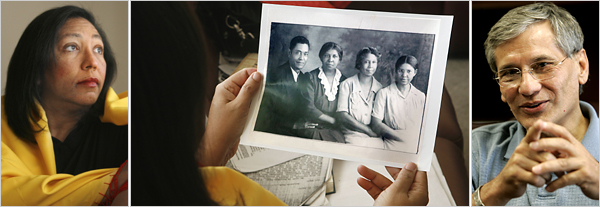Although the so-called Cherokees of Alabama have been "recognized" by the state of Alabama, state recognition requires no process for documentation as a legal, historic tribal government. State recognition often gives fraudulent tribes undeserved credibility and improper access to funding. It also violates the commerce clause of the U.S. Constitution.
Fraudulent groups and individuals passing themselves off as Native Americans have become big business, with more than 200 groups that claim to be some sort of Cherokee tribe. There also are hundreds of individuals who claim to be Cherokee or from the Cherokee Nation and offer services ranging from teaching culture to spiritual advice. The Cherokee Nation does not question anyone's claims of heritage or ancestry, but points out the significant difference between claiming heritage and having citizenship in a federally recognized tribe.
There are only three federally recognized Cherokee tribes: the Cherokee Nation and the United Keetoowah Band of Cherokee Indians, both located in Oklahoma, and the Eastern Band of Cherokee Indians in North Carolina. No group outside of North Carolina and Oklahoma has been recognized as a legitimate Cherokee sovereign.
The "Eastern Cherokee Nation" and "Western Cherokee Nation," including the "old settlers" and "late immigrants," joined in an Act of Union on July 12, 1839. There were no "lost" Cherokee tribes or splinter groups that hid out or dropped off the Trail of Tears. Those who have Native American ancestry but are not eligible for citizenship in a federally recognized Indian tribe should participate in the culture through heritage groups and associations, not groups that call themselves "tribes" or "nations."
Fake tribes and individuals with unverifiable ties to Native American citizenship often claim to be passing on Cherokee cultural knowledge and traditional arts. But these groups and individuals dilute true Indian culture and identity. Many of them pass along cultural information that is incorrect or that perpetuates harmful stereotypes.
Chad Smith
Principal chief, Cherokee Nation
Fraudulent "Cherokee" Organizations
Comment: For more on the subject, see Cherokees Battle Identity Theft and Hoklotubbe on Who's a Cherokee.
Below: Marilyn Vann and Chad Smith have battled over the Freedmen issue.


6 comments:
People choose famous tribes or tribes that don't have good records. With Cherokee, you have both.
No easy answers here, but it is true that many Cherokees went west before the removal, some ending up in Arkansas, some ending up in other locales. Some of these Cherokees reunited with the the broader tribal communities in Oklahoma and North Carolina, others did not.
Furthermore, some traditionalists in Oklahoma and North Carolina refused to sign the Dawes rolls. And others understated their blood quantum so as not to become wards of the court. And many just intermarried and assimilated.
On the other hand, there are many, many people who claim Cherokee ancestry on pretty dubious grounds. (and to boot, there are many card carrying Cherokee who know nothing of their tribe's culture)
So it is more complicated that it looks on first glance.
I would also say I would have more sympathy towards the perspectives of the federally recognized Cherokee tribes if it weren't for the CNO's stance regarding the Freedmen and the ECN's stance towards the Lumbee.
Good point, Anonymous. There's a reason 200 groups aren't claiming to be Navajo, Lakota, or Apache. It's because they can't.
If the Trail of Tears had really caused a splintering effect, there'd be hundreds of tribes claiming to be Creek, Choctaw, Chickasaw, and Seminole as well as Cherokee. And yet there aren't hundreds of these tribes. Why not?
I conclude that most of these Cherokee tribes are filled with wannabes. I.e., people with a tiny amount of Cherokee blood who think that makes them Indian. To me they're non-Indians with a bit of Indian blood, not Indians.
P.S. For newcomers to this blog, we've debated the Cherokee/wannabe issue many times. For instance, see Rob Shouldn't Judge Natives? and the associated links.
I haven't seen a good list of all non-federally recognized tribes.
However, Wikipedia does have a pretty good list of all state-recognized tribes (which aren't federally recognized)...
http://en.wikipedia.org/wiki/State_recognized_tribes
There are quite a few Cherokee ones on the list, but there are quite a few other tribal backgrounds, some of tribes that do not not have federal recognition at all, some that are in weird limbo land (the Lumbee) and some that are federally recognized.
So I think it is a bit more complicated than that. I suspect there are many wannabes on the membership lists of these groups, but I also think many of these groups have pretty tight standards and serve a valuable function, in providing community and services to Indians who are "actual Indians" (using the definition you gave at http://newspaperrock.bluecorncomics.com/2008/11/actual-indian-defined.html ), but who do not have CDIB cards due to historical circumstances.
Should mention (in the interest of making my own bias clear), that I am a non-status Cherokee, whose ancestor did not sign the Dawes roll because her white husband forbid her to do so.
I have not joined any of the non-federally recognized groups, because the ones I've checked into seem to be more about the egos of their leaders than about cultural preservation. So instead, I try to learn the language and participate in cultural events when I can.
Post a Comment